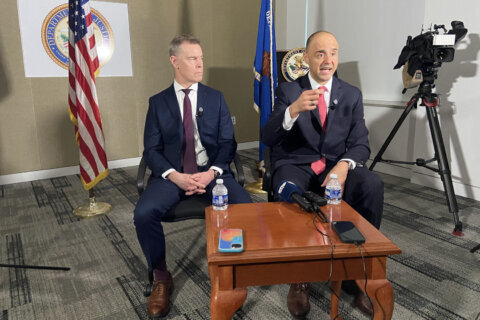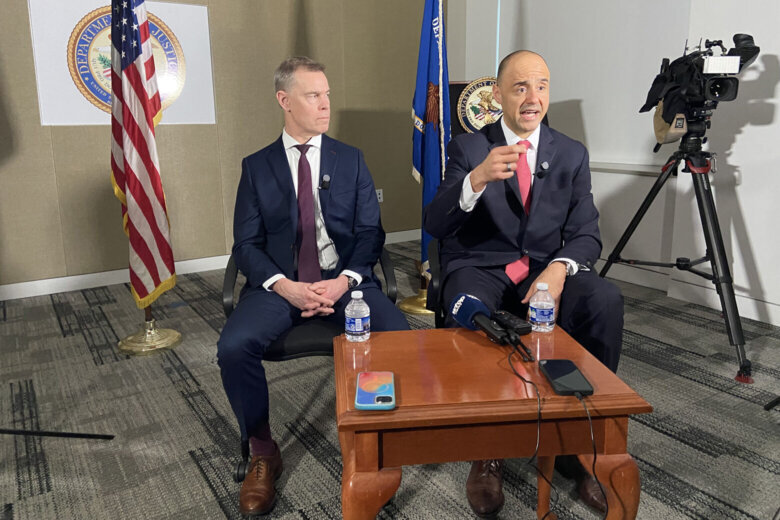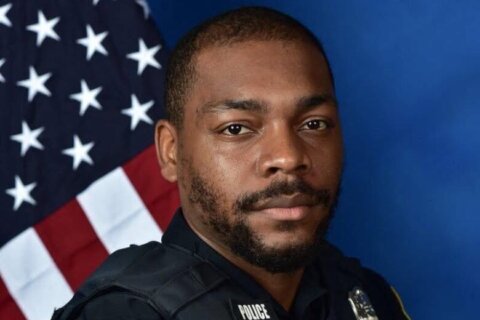
A focus on collaborating with federal law enforcement officials and digital media is helping the U.S. Attorney’s Office prosecute violent crimes in the District.
Matthew Graves, the U.S. Attorney for D.C., said Friday that by realigning resources, his office should be able to “pick up the pace” on prosecuting crimes that involve guns and carjackings.
Part of that, Graves said, involves having analysts who usually comb through phone and other digital evidence as part of one crime scene, step back and review data to determine if there are any patterns.
That team works with investigators, according to David Sundberg, assistant director of the FBI’s Washington Field Office. But instead of focusing on one case, the priority is making connections between them.
The collaboration comes as D.C. residents have grown frustrated about carjackings and shootings in all parts of the city.
Last month, the Justice Department announced plans to add more resources to combat crime in the city. In Graves’ office, there are additional prosecutors focusing on cases involving guns and carjackings, and more prosecutors from the Justice Department’s criminal division are working on cases involving violent crime.
“The reason for this surge, or change in approach, is because, frankly, people are connected in a way they weren’t connected before,” Sundberg said. “There wasn’t the prevalence of things like social media, and the Internet of Things, and all of these ways the modern world connects people.”
The evolution of social media has changed how and where crimes are committed, Graves said. Previously, violence was connected to the drug trade or it was based on conflicts between neighborhoods.
Now, Graves said, some crimes in D.C. are the result of social media disputes that escalate across “different parts of the city that weren’t connected before.”
That’s factored into the way prosecutors strategize. To prosecute violent crime, Graves said his office is using evidence commonly associated with white-collar crimes. In recent cases involving conspiracies, Graves said prosecutors were able to detail communications between conspirators because of digital tools, such as email accounts.
Data was used in a recent carjacking ring case involving teenagers, Graves said, and another focused on a group accused of robbing jewelry stores along the East Coast.
Digital trails are also helpful in finding more evidence and connections, Graves said. But it’s a time-consuming process, revealing the need for the extra help.
“More and more, it’s the case where we are proving both federally and even with our local reactive charges, a case is based on social media and communications and the conspirators’ words, and not just having to rely on hoping to get an eyewitness or someone who becomes a cooperator,” Graves said.
Between fiscal years 2022 and 2023, Graves said, there was a 58% increase in federal prosecutions of cases targeting “individuals that we believe are driving gun violence.” There were 137 people charged with homicide in local court last year, he said, but based on trends, the department realized the need for more help.
“We’ve seen a number of instances over the last year where people, either in their neighborhood or maybe even personally, know someone who was carjacked or robbed,” Graves said. “And that is really scary. What I want people to understand is that we get it, that there is a plan in place, [and] that plan has started to have some impact.”
‘Can’t happen overnight’
Carjackings and homicides have been rising in D.C., Graves said, which is why it’s taking time to see a significant change.
“These have been trend lines that have been building for years,” he said. “Unfortunately, the work of unpacking them can’t happen overnight.”
Graves said his office has the authority to prosecute 16- and 17-year-olds as adults if they’re “engaged in any pattern of conduct, which is unfortunately, what we’re seeing more and more with these armed carjackings and armed robbery sprees and patterns.”
Some cases are challenging, because older teenagers are working with younger ones who Graves said his office can’t prosecute. Sometimes, that means contemplating whether to charge them together or in different courts.
“There are challenges once we’ve charged, with our jurors, our fellow citizens, and the courts, in terms of having a 16- or 17-year-old charged as an adult and feelings about that, because a number of these 16- and 17-year-olds, in fact look like 16- and 17-year-olds,” Graves said.
As part of the collaboration between agencies, Sundberg, with the FBI, said D.C. police officers are embedded in the FBI’s Violent Crime Task Force, and the FBI has agents working with D.C.’s Carjacking Task Force.
“The single most important thing we can do when we’re seeing trends like this is send a strong and unequivocal message that this is not some kind of small joy riding, free cars, victimless crime,” Graves said. “It is a very serious, adult crime and there will be significant consequences.”
Graves said his office is “laser-focused on community safety.”
“It’s one thing for numbers to change, but safety is very personal.”
Get breaking news and daily headlines delivered to your email inbox by signing up here.
© 2024 WTOP. All Rights Reserved. This website is not intended for users located within the European Economic Area.









